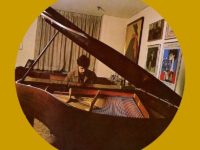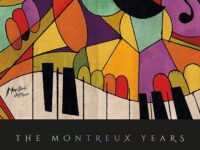photo: Francesco Truono
In the winter of last year, Chick Corea and Stefano Bollani performed at the famed Umbria Jazz Festival in Bollani’s home country of Italy, with no other instrumentation beyond two pianos positioned facing each other and the two masters from different generations sitting behind them. The souvenir from this encounter goes on sale next week in the form of a sprawling, 2-CD set from ECM entitled, Orvieto.
This is hardly the first time Corea has made a piano-only duets record, as there’s been been five prior occasions. He and Herbie Hancock made one in the 70s that’s probably his best known one and just a couple of years ago, he squared off with Japanese wunderkind Hiromi (Duet, 2009).
Corea subtly adjusts his attack to better mesh with whoever his partner is, and with Bollani, there are heavier, classical, European overtones heard on this record. It’s not always easy to tell who is playing which part, but that’s probably a detail that will only matter to the most hard core fans of each; they mesh together well, and that will matter more to everyone. Bollani, for his part, is more than up to the task of going one-on-one with the legendary Corea; anyone who is familiar with Enrico Rava’s recent work or Bollani’s own albums understand this.
It’s been quite a while since Corea last made a recording for the renowned ECM label—twenty-seven years, to be more precise—but the two components that figure strongly in this album, improvisational immediacy and chamber music elegance, make ECM the most logical marque for bringing this music to the masses. The length and the complexity of this album could justify a long essay of analysis, but the program of mostly covers, vintage Corea tunes and some collaborative extemporaneous composing might be best illustrated by a selected track from the performance, the half-instant construction/half-cover “Orvieto Improvisation No. 2/Nardis.”
“Orvieto Improvisation No. 2/Nardis” begins the way most paired improvisations begins: participants tentatively probing each other and going down paths until they find one where they can find an escape out to the other side. As the song moves from softness and space to tautness and thickness, the two maestros take some interesting side trips as they go along a still loosely defined progression until something emerges from the fog that eventually points the way.
“Nardis” begins to pop up in a quote—a half a quote, really—just past four minutes into the improvisation, but embryonic fragments can be detected around two minutes in…so vaguely related to the “Nardis” melody, it could have been a coincidence that got Bollani’s and/or Corea’s imagination fired up and led them down the path toward this song. By the five minute mark, the improvisation is all but abandoned and the two are now locked in on Miles Davis’ whimsical, dark harmony, four hands playing full chords, determined to weave an entire outfit out of a single thread of the song.
It’s impossible to know just what is coursing through the minds of musical geniuses as they find their way through songs as they’re creating them, and that applies even more so when there’s two of them involved in such an endeavor. But speculating on what they’re thinking as they’re performing is part of what makes listening to these kind of songs fun and intriguing. “Orvieto Improvisation No. 2/Nardis” is one of these kinds of songs.
[amazon_enhanced asin=”B005EJGUBA” /] [amazon_enhanced asin=”B005F7F3X2″ /] [amazon_enhanced asin=”B001OD6HA4″ /] [amazon_enhanced asin=”B001QP9SQK” /] [amazon_enhanced asin=”B002HWBSMI” /]
- David Torn – ‘Adityahridayam 321’ (2024) - May 5, 2024
- Ivo Perelman + Matthew Shipp – ‘Magical Incantation’ (2024) - May 4, 2024
- Tomeka Reid Quartet – ‘3+3’ (2024) - April 30, 2024




